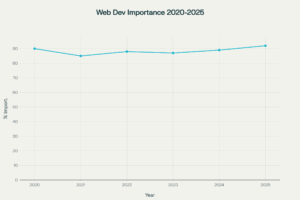Get ready to know the real truth in a hot debate of the tech world: Is web development coming to an end now, or is a cool new look emerging for the future? Get tight, because we will take a deep dive here—that too from the perspective of a guy who has been on the digital battlefield for 20 years. No excuses, just real industry insights, the latest trends, and fun numbers, and that too in pure US style, with a little slang—straightforward, bold, and unapologetic!
Table of Contents
Why are people thinking that web dev is dead?
Let’s cut through the noise—why the Reddit threads, hot takes of Hacker News, and “Web Dev is Dead!” memes are everywhere. But what is the real thing? Web development is not gone—it’s just that the old form has changed. Every field evolves, and web development is changing at a rapid pace. The smart ones are riding this wave; those who aren’t are stuck beneath it. Copycats, DIY-ers, and no-code talk.
Copycats, DIY-ers, and No-Code Talk
Websites that grab people’s attention, convert leads, handle a heavy backend, or work on the scale of big companies or startups—they still demand real web development skills! Clients don’t pay premium money just for templates or copy-paste sites.
They need:
- A completely custom-made solution
- Real performance and speed
- Solid SEO (want to be on top in Google!)
- Killer UX (users need to enjoy)
- Original branding
- Analytics & reporting
- Security and strong support
No DIY tool, no bot, and no drag-and-drop builder can provide all these things in as fun a way as a professional web developer can. That’s why, if you want to win the real game, you must have real skills!
Data Talk: What’s Happening in Web Dev Hiring & Market Value?
Let’s talk numbers, not theories.
-
U.S. market size for web development services in 2024: Estimated at over $65B and growing.
-
Web dev job outlook (2025+): The US Bureau of Labor Statistics projects continued growth for web developers, especially in mobile optimization, advanced UX, and security.
-
Serverless architecture market: Projected to hit $17.78 by the end of 2025—meaning businesses are doubling down on modern website backend tech.
Chart: Perception of Importance of Web Development (2020–2025)
Look at this trendline—web development is not dying. Its perceived importance is rising again after a slight dip, as this field is adopting and expanding its tools and skills in new ways.

What is changing in web development?
Nowadays, the question is not “Is web dev dying?” – the real question is: “How does today’s web dev look, and who is the boss of the game?” Let’s see, in today’s language, the top trends that are shaking the world of web development.
1. AI-Powered Development
Now, AI tools like GitHub Copilot, ChatGPT, and Tabnine are making the work of repetitive coding easy and fast. Simple: Now the boring code-writing work is on machines, but the real developer still has to give direction to the project, plan the architecture, and think big about the business. In short, AI has become the developer’s assistant, not a replacement!
2. Immersive Tech (AR, VR, MR)
AR (Augmented Reality), VR (Virtual Reality), and MR (Mixed Reality) are no longer just fancy words. With WebXR frameworks and browser-based VR experiences, websites are no longer flat; they are now 3D. Devs who have these skills are in super high demand in the market—especially in gaming, education, and e-commerce!
3. Progressive Web Apps (PWAs)
PWA technology has almost removed the line between websites and mobile apps. PWAs are super fast, install, send push notifications, and work offline too. Now brands need their site to run smoothly on every device—this has become possible by creating a PWA.
4. Headless CMS & Serverless Backends
Nowadays, headless CMS and serverless backends are being used to serve content. Meaning less tension in the backend, full-on performance, and scalability. Content management and delivery are now separate—integration with modern frameworks like React, Next.js, and Vue is buttery smooth.
5. Voice-Activated UI
You must have seen smart speakers! Voice command is trending in US homes, and this is why the craze for web apps that are controlled by voice is increasing. Now websites can be operated not just by click or touch but also by voice—this puts accessibility and engagement at the top.
6. Blockchain & Decentralized Web (Web3)
Web3, blockchain, NFTs, data security—all these buzzwords are now becoming reality. The shift towards Web3 is slow, but its adoption is heavy in fintech, gaming, and privacy-driven projects. The decentralized web is going to give users full control of their data in the future.
7. No-Code/Low-Code
Now even a non-techie can easily create their site—with the help of drag-and-drop builders, ready-made templates, and visual interfaces. This is great for small businesses, freelancers, and marketers. But the point remains: for complex, scalable, and custom requirements, an expert developer will still be needed. Simple things can be managed with no-code tools, but building a real next-level site still requires the expertise of a skilled dev.
How AI, Automation, and No-Code are Disrupting (But Not Killing) Web Dev Jobs
These days, AI, automation, and no-code tools are not killing web development jobs—they are just making boring and repetitive work super fast. Meaning, CRUD-type apps can now be made at the click of a button, but the real magic is still done by humans! Things that Bots can’t do
Some things are not yet the sole focus of any AI, automation, or tool:
- Strategic thinking and solving real business problems
- Custom, advanced UX/UI, motion design, or accessibility tricks
- Juggling big data, performance tuning, or integrating enterprise-level APIs
- Testing, QA, bugs in the kabaddi match, or security compliance (no shortcuts)
- Feeling, understanding, and providing the right solution to the client’s real needs
People who just copy-paste templates or haven’t updated their skills—they are lagging. But for those who are all-rounders like a tech-savvy Swiss Army knife—tech + business + strategy + a little empathy—the demand for them is tremendous.
Skills that keep devs in the game
2025 “must-have” list:
- Friendship with AI & automation tools (Copilot, Tabnine, etc.)
- JavaScript is still king: React, Vue, Angular, TypeScript
- APIs, serverless, AWS/Azure/Netlify/Vercel basics
- Accessibility & inclusive UX design
- Mobile-first thinking is a must
- Advanced security (OAuth, encryption, ethical hacking basics)
- Communication, documentation, and business understanding
USA Angle: What’s new in web dev here?
US companies need devs who:
- Can think in the situation—not just deliver, but also solve problems and lead
- Impact business growth, sales, retention, LTV, etc.
- Understand US regulations: ADA, California Consumer Privacy Act, etc.
- Speak English, and understand regional slang—(“y’all”, anyone?)
Table: Old School vs Next-Gen Web Dev
| Area | Old School (2010s) | Next-Gen (2025+) |
|---|---|---|
| Build Tools | WordPress, HTML/CSS | JAMStack, Headless CMS, WASM |
| Client Type | SMB, Blog | SaaS, Mobile, AR/VR, Web3 |
| Language | PHP, jQuery | JavaScript, TypeScript |
| Focus | Coding, Layout | Business outcome, Strategy |
| Security | Manual, Basic SSL | Automated, Advanced Auth |
| Automation/AI | Rare | Har jagah—tool-driven coding |
| Dev Role Expectation | Just build it | Consult, Solve, Collaborate |
What’s Next: 2025, 2030 & Beyond
In today’s fast-changing technological world, continuous learning is vital to stay updated as technology changes rapidly and keeping your knowledge fresh is a must. Today’s teams are small, agile, multi-skilled and remote-first, which helps to adapt quickly and bring together different skills. Developers who can create AI-personalized UX, meaning dynamically tailor websites according to the users, are in great demand in the market as such experiences increase user engagement. At the same time, clients now want ethical and green development practices, including optimized code and inclusive design, to focus on both sustainability and accessibility. As globalization drives, websites must run smoothly on every device and location, for a consistent experience everywhere. Further impact will grow from emerging Web3 and blockchain technologies, which will take decentralization further and transform the way web applications are built and run.
Final Word: Web Dev Ain’t Dead, But You Gotta Evolve
Is web development dead? Never, boss! The field has become very tough and advanced, but whoever adapts to new tools, AI, and strategies is at the top.
Don’t just code—lead, grasp the strategy, and solve the client’s problem. This is the real victory—it doesn’t matter whether it’s the US or the globe.
Article based on latest US market stats, labor data, and real web dev community insights for 2025. No excuses—only what can keep you ahead of the times.
Citations:
-
https://seolocale.com/is-web-development-dying-the-truth-about-its-evolution/
-
https://www.digitalsilk.com/digital-trends/web-development-trends/
-
https://www.geeksforgeeks.org/blogs/top-web-development-trends/
Addressing Common Questions
1. Is web development a good career in 2025?
Absolutely! With the continuous growth of the internet and digital services, web development remains a lucrative and stable career choice.
2. Will AI replace web developers?
AI will augment the work of developers but won’t replace them. Human creativity and problem-solving are irreplaceable.
3. Are no-code platforms the future?
No-code platforms are useful for simple projects but can’t handle complex, custom requirements. Professional developers are still needed for advanced solutions.
4. What skills should web developers focus on?
Developers should focus on learning modern frameworks, understanding user experience design, and staying updated with the latest technologies.
5. Is there still demand for web developers?
Yes! The demand for skilled web developers continues to grow as businesses expand their online presence.

